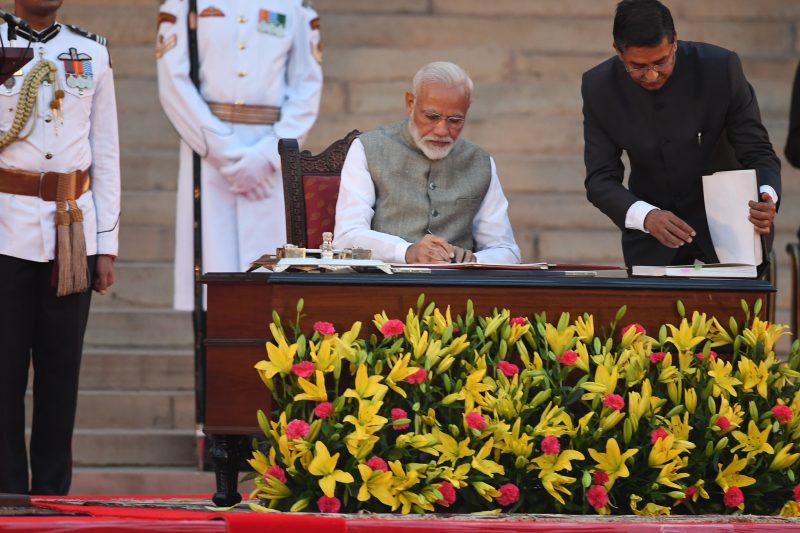India’s Modi sworn in, set to name new government
Indian Prime Minister Narendra Modi signs documents after taking the oath of office for a historic second term (PRAKASH SINGH)
New Delhi (AFP) – India’s Prime Minister Narendra Modi launched his historic second term at a solemn ceremony in front of cheering supporters Thursday ahead of unveiling a revamped Hindu nationalist government.
Modi was the first of more than 50 cabinet ministers and deputy ministers to be sworn in at the presidential palace in front of 8,000 people including South Asian leaders, Bollywood stars and leading political figures.
Presidents and prime ministers from neighbouring Bangladesh, Sri Lanka, Nepal and the Maldives were present, but arch-rival Pakistan was not among those invited.
Modi’s right-wing Bharatiya Janata Party (BJP) made history by increasing their majority in a second straight landslide election win.
The 68-year-old prime minister walked up to take his oath of office to a standing ovation, with supporters in the crowd chanting “Modi, Modi”.
“Honoured to serve India!” he said on Twitter soon after.
– Cabinet prizes –
Modi was expected to announce his new cabinet in the hours after the ceremony.
A new finance minister was guaranteed after the influential outgoing minister, Arun Jaitley, 66, announced Wednesday that he would not serve again because of poor health.
Some media reports said Modi’s trusted enforcer, BJP president Amit Shah, would take the finance portfolio even though he has no experience as a minister in the national government.
Shah was among 24 people to take an oath as a full cabinet member.
Outgoing foreign minister Sushma Swaraj was not among the group to take the oath, meaning she would also be replaced.
S. Jaishankar, a career diplomat and specialist on China and the United States, was a surprise inclusion in the cabinet list. Analysts said that if he becomes foreign minister, it could indicate Modi will give more emphasis to ties with the leading global powers.
The Indian leader is expected to host China’s President Xi Jinping for a summit in October.
– ‘New India’ –
Modi won the election after portraying himself through the campaign as a nationalist strongman who would protect the country’s security.
He was aided by a military showdown on the border of divided Kashmir when Indian and Pakistani fighter jets staged tit-for-tat raids.
Modi said he needed a new term to further his promise of a “new India” taking its place as a rising economic power in the world.
Smriti Irani, who pulled off one of the biggest victories of the election by beating opposition Congress party leader Rahul Gandhi in his own family bastion, was expected to get a promotion after being demoted in Modi’s first term.
Gandhi, whose party suffered a second straight humiliating defeat, was among the crowd with his mother Sonia, the former Congress leader.
Media reports said Gandhi — the son, grandson, and great-grandson of Nehru-Gandhi dynasty prime ministers — has told party leaders he wants to stand down.
But party supporters have staged demonstrations outside his home calling on him to stay.
– Nationalist agenda –
India is expected to overtake Britain as the world’s fifth-biggest economy in 2020.
Modi’s government is expected to push a strong Hindu agenda, including the construction of a new Hindu temple on the site of a Muslim mosque razed during riots in 1992 in the holy city of Ayodhya.
Many Hindus believe a spot in the city marks the birthplace of Lord Ram and that the medieval Babri mosque that stood there for 460 years was only built after the destruction of an earlier temple.
India’s Supreme Court has named a three-man panel including a famous guru to resolve the seemingly intractable and highly emotive dispute.
But the temple was promised in the BJP’s election manifesto.
“Nationalism is our inspiration … good governance is our mantra,” Modi said at the launch of the manifesto that also vowed to spend more than $1.4 trillion on new infrastructure over five years to create much-needed jobs.
While India’s economy grew at about seven percent each year during Modi’s first five-year term, it did not produce the jobs needed to find work for the estimated 1.2 million job seekers entering the labour market each month.
Disclaimer: Validity of the above story is for 7 Days from original date of publishing. Source: AFP.


